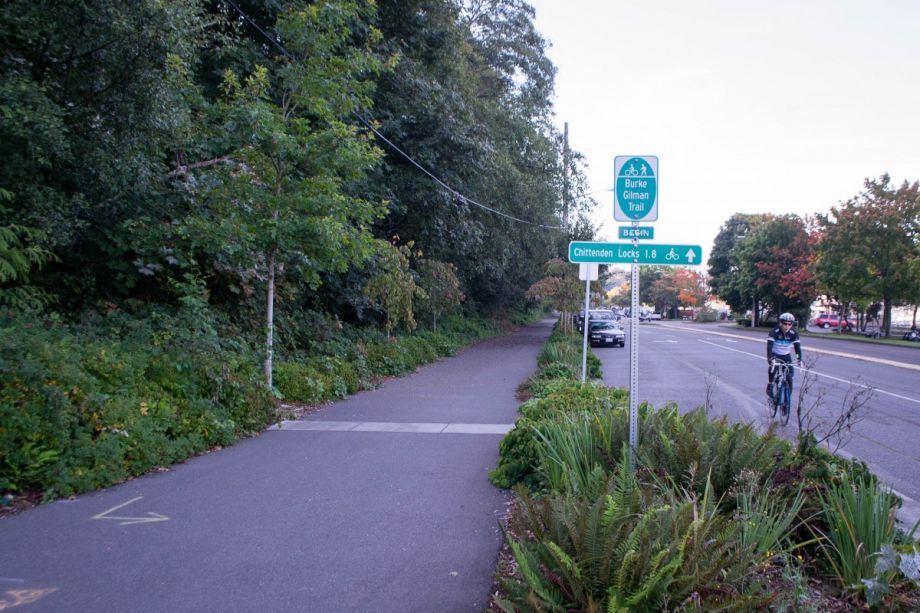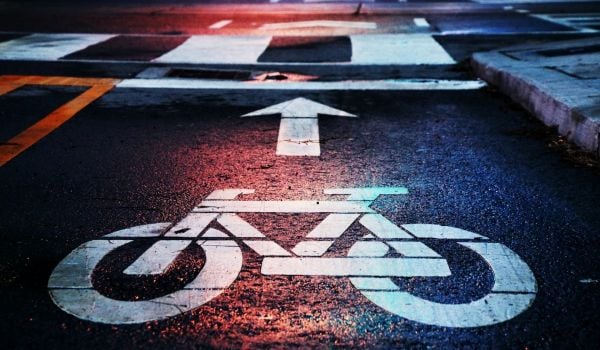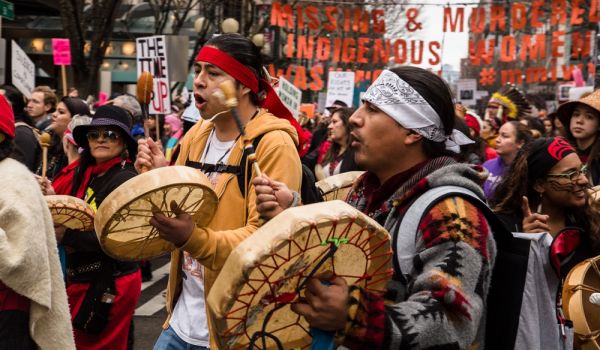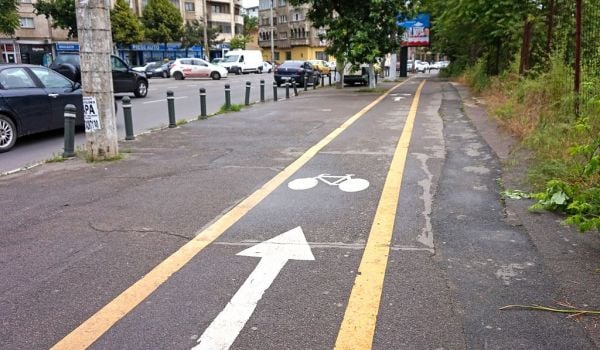Just about every major proposed bike project is met with pushback. Often, it’s just complaints leveled at design review meetings or city council hearings. Sometimes, it’s lawsuits to block a project’s completion. In Seattle, the Burke Gilman Trail’s “Missing Link” saga will go down in the annals of contentious, obstructed bike plans. It’s taken nearly two decades of planning, environmental impact review, lawsuits, appeals, protests, political deal making and more, but the Missing Link may finally get completed next year.
Seattle Mayor Ed Murray held a press conference last week to announce that the project’s long-warring supporters and opponents had reached a compromise on the design and lawsuits would be dropped. He was joined by representatives from the Department of Transportation, Cascade Bicycle Club, the business owners behind the lawsuits and others.
“Much in the way we worked collaboratively on the Westlake bike lane, we came together and we had some pretty difficult conversations. But we found a way to complete the gap on the Missing Link trail,” Murray said at the press conference.
The we-finally-talked-like-adults message was the theme of the day, with every speaker echoing it in some way. And whether or not the current love fest belies the difficulty of the closed-door negotiations that got all parties to that place, it certainly marks a departure from each side’s historical stances.
To understand why a compromise on the design of a 1.4-mile section of bike trail is worthy of a mayoral press conference, you need to know a bit of the history of the trail and its incomplete bit in the Ballard neighborhood.
The Burke Gilman is a 19-mile former rail line turned multiuse trail that runs west to east from the shore of Puget Sound all the way to the top of Lake Washington in Kenmore, a Seattle suburb. It is the most heavily trafficked trail in the city, popular with commuters and sport cyclists and runners and dog walkers and everyone in between.
As its name implies, the Missing Link is a 1.4-mile section of missing trail in Ballard that sits between two sections of completed trail. To navigate the gap, riders must cross a railroad track (many cyclists have crashed on the rails over the years and a bunch of them have broken bones in the process) and ride along a few busy road sections that lack any bike infrastructure.
The city began purchasing right of way along the railroad tracks in Ballard the late ’90s in hopes of making the trail whole. SDOT did the first Ballard Corridor Study in 2003 and outlined a preferred trail alignment. In 2008, then-Mayor Greg Nickels appropriated funding to complete the Missing Link. SDOT did an environmental review of the project that gave a greenlight to the city.
A group of Ballard industrial businesses and the Ballard Chamber of Commerce appealed the review findings, arguing that the trail would have significant impact on them since it would cross in front of dozens of driveways used by huge trucks and truck-bike (or truck-pedestrian) crashes would be inevitable. An examiner ruled in the city’s favor. The business group appealed the decision to King County Superior Court in 2009, which eventually ruled that the city had to complete another environmental review. This led to years of increasingly thorough environmental reviews, more appeals, more court fights, demonstrations and tensions between bicyclists and businesses that coalesced into something of a standoff.
Finally, last summer, SDOT released the results of its latest environmental impact study with three potential alignments for completing the trail. Last week’s press conference was held to announce the compromise trail alignment that would allow the project to move forward.
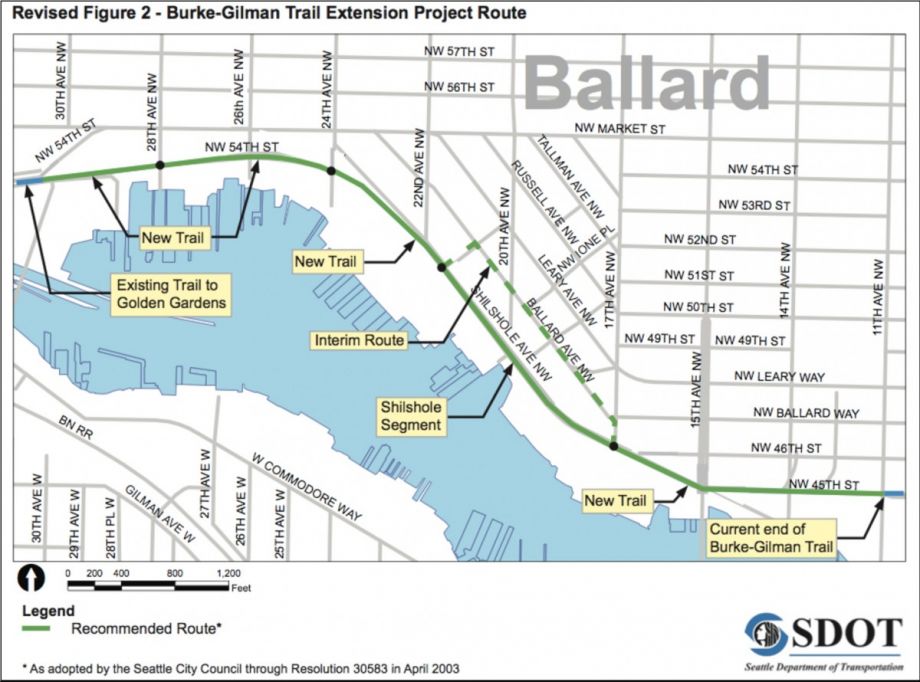
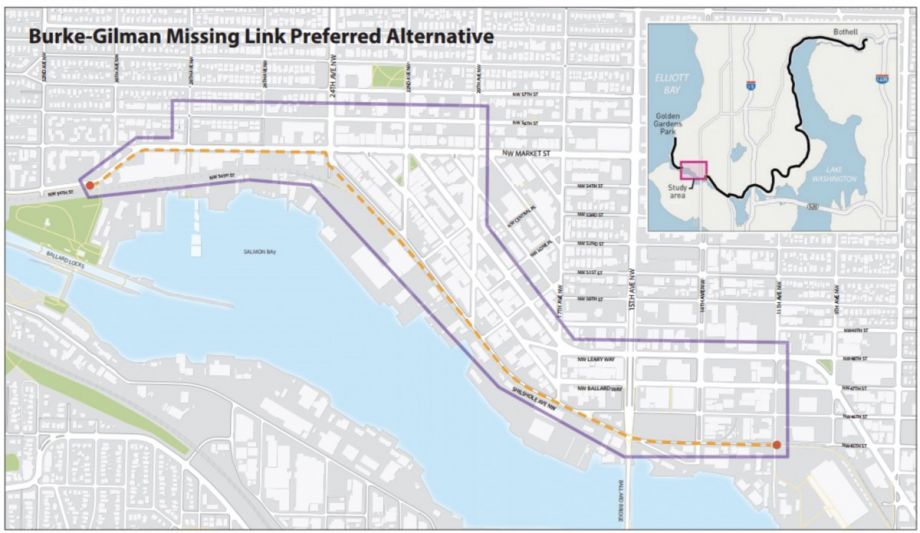
The proposed original alignment of the “Missing Link” completion that spurred protests by business owners is shown top, the compromise alignment below. The new section of path originally was set to curve onto 54th Street, a gravel road that passes by industrial business driveways, instead of using Market Street.
Rather than continuing the off-road trail along the rail line as the city and Cascade Bicycle Club fought for all these years, the Missing Link will be completed with a slightly more circuitous route that takes the trail away from most of the industrial businesses. The plan is to build an on-road trail of sorts. A Cascade rep at the press conference told me it will not be a two-way protected bike lane, but instead a trail adjacent to the sidewalk.
“I’m kind of all grins right now because this is a project we’ve been working on so long,” said Council Member Mike O’Brien at the press conference. “I’ve got to check myself a little bit because we’re not done yet. I know there are some advocates who’ve been working on this for decades who say we’ve heard this before. But I’ve got to tell you, it feels like we’ve made a huge step forward with making this announcement.”
The business reps at the press conference were clear it was the city’s and Cascade’s shift in approach that got them to drop the lawsuit.
“Even though we [and the Cascade Bicycle Club] have been at war on this piece, they’ve been much more flexible on this in the last several years and been willing to sit and talk to us and deal with safety issues,” said Eugene Wasserman, North Seattle Industrial Association president. “A major change that brought us to the table is the attitude of [SDOT Director] Scott Kubly and his staff not using old dogma of how we do bicycle trails and listening to concerns of the freight community.”
The new alignment will require the city to remove parking and run the trail in front of different businesses, so there’s still a possibility of obstruction from a new set of opponents. But Murray is confident this marks the end of the long fight among the city, bike advocates and Ballard’s industrial business owners. Citing success settling out of court for other recent lawsuits against the city, he said, “I feel pretty good that we have a track record of reaching agreements and moving forward, and I have that commitment from the businesses involved [in the Missing Link suit].”
SDOT will now move forward with designing the trail. The city is aiming for breaking ground in early 2018. Continuing with the theme of love and compromise, the design process will have input from many stakeholders.
“This process won’t always be easy,” Kelsey Mesher, Cascade’s policy manager, said. “It will take dedication and that same willingness to work with all parties.”

Josh Cohen is Crosscut’s city reporter covering Seattle government, politics and the issues that shape life in the city.
Follow Josh .(JavaScript must be enabled to view this email address)

